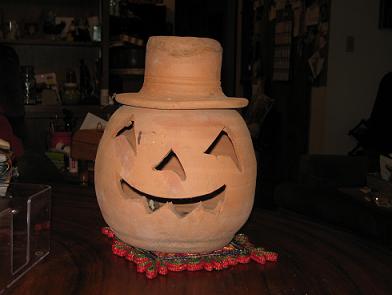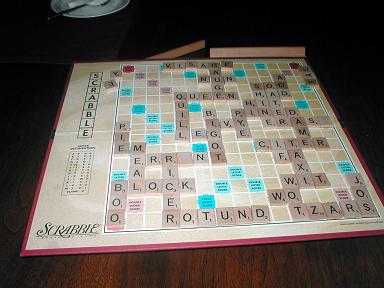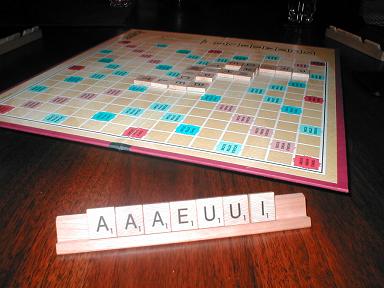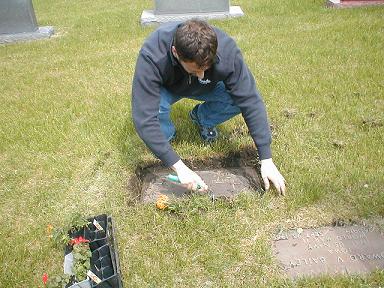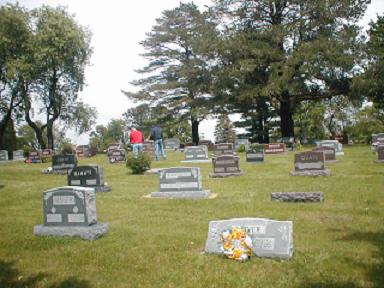Yesterday I put away1 the Christmas stockings2. We had taken them down a few days ago, but now they had to be stored away3 for another year. It’s always lots more fun to put up the Christmas decorations4 than it is to take them down. When we put them up, there is always the anticipation5 of the Christmas to come, the festivities6, gift giving7 etc. When we take them down, all the fun8 is over and there’s nothing but the gray, bleak9, often cold, weather of January. Some people say it depresses10 them; it doesn’t depress me…I just don’t like the fuss11 of putting all the things away. Don’s big job at Christmas time is putting up13 the white icicle lights14 that twinkle15 on the wood at the edge of our roof16. Everyone on our little one-block long street17 has them, so it makes for a very pretty street when anyone turns in to it. Now they are all gone for another year. Don also puts away our artificial Christmas tree18 that we now use instead of buying a real tree.
Yesterday was also January 6th. In Christian mythology19, it’s also known as Epiphany20, the day that 3 wise men21 from the Middle East were supposed to have given the baby Jesus22 precious23 gifts of gold, silver, and myrrh24. In most Latin American25 countries, January 6th is a very important part of Christmas. Children get their Christmas gifts26 on that day instead of on December 24th or 25th. In the U.S., we ignore27 it for the most part28. Yet as children, one of our favorite Christmas songs29 is “The Twelve Days of Christmas30,” which refers to the twelve days between December 25th and January 6th. In fact, when our daughter Kim was young, she loved it so much that I had to repeat31 it over and over for her. To this day, she can repeat every word of it even though it is quite long. The song is fun because it tells about how each day someone gave a special gift to his true love. Each day one has to repeat all of the gift names. It’s fun for kids and adults alike. In fact, this year at the college Christmas candlelight concert32, Mark, the choir leader33, included a very clever version34 of “The Twelve Days of Christmas” as part of the concert, and it brought cheers35 from the audience36 after its performance37. I’ll include the words at the end of this.
But back to Christmas (and its end). We celebrate38 our Christmas in our traditional39 way when we are in Pella. Sometimes we go to our vacation home40 in the Rocky Mountains41 in Idaho42. In fact, we had planned to43 this year, but Mother Nature44 intervened45. There was a terrible snow storm (it qualified as a blizzard46) that shut down all of the highways through Kansas47, Colorado48, Nebraska49 and Wyoming50. We stayed home and are glad we did, as there have been even more storms in that area since. Anyway, we ate our traditional foods (chili51 and oyster soup52 along with Mexican Christmas Eve salad, a delicious fruit salad, on Christmas Eve53, and tenderloin beef54 with escalloped potatoes55 and green bean casserole56 for our Christmas dinner) and enjoyed them. We then opened our major57 gifts on Christmas Eve and our stocking gifts58 (called stocking stuffers59) on Christmas morning. I had given everyone a flashlight60 that doesn’t ever need batteries61, and they all seemed pleased. I found them in one of the many catalogs62 I received and ordered them over the phone, to be sent by mail. One makes the flashlight work by winding it up63. Then it will operate for 30 minutes. Oh yes, I got one for myself too. We all received nice gifts, but the one I especially appreciated was from Don. It’s a really nice silver chain64 that I now have a lovely gray pearl65 on (given to me by a dear friend in China). The brilliance66 of the silver sets off67 the beauty of the pearl.68
Of course, we did other Christmassy68 things. I especially enjoyed the Christmas carol70 singing that is held each year in a little century71 old country church about fifteen miles from here. People crowd into the place and choose the Christmas songs that we will sing, accompanied72 by the little old organ73 played by our friend Davis. People come there from our town, neighboring towns, and the nearby farms. Since we don’t all know each other, we can easily socialize afterwards by having hot cider74 or coffee and Christmas cookies75 that some of us have baked. Kim made lots of them.
Music is important to us, so we were pleased when some of the college choir members came to our house to sing Christmas carols. Caroling76, as it is called, is also an old tradition in the U.S. and England. We knew they were coming so had cookies and drinks ready for them too. One other evening we entertained a long-time group of friends at a potluck77 in our home and had a college student come to sing and play Christmas carols for us. He had a lovely voice and everyone enjoyed it immensely. We might see if we can arrange something like that again for next year. We also had a joke gift78 exchange79 that evening, which added much fun and laughter to the event.
Of course, a major part of our enjoyment of the Christmas holidays was when our granddaughter Cassie was with us. She’s a delightful seven year old who had a great time walking the dog with Grandpa Don and baking cookies with Aunt Kim. Then Cassie loves it when we deliver the cookies to elderly and shut-in friends80. We‘re glad that she has an early concept of being nice to people. Kim started the cookie delivery fun with her last spring when she came to visit and we made and delivered May baskets81 filled with cookies to people on May 1st (another old American and English custom, only traditionally the baskets have flowers instead of cookies). Cassie always has more things she wants to do in Pella than she ever gets done. That’s ok because that way she’s always eager to visit us.
Enough about our Christmas. Yes, it is over, but the good memories82 and feelings last for all of us, even after the tree, stockings, lights, and other decorations have been put away. Meanwhile, here are the words of “The Twelve Days of Christmas.”
On the first day of Christmas my true love gave to me a partridge83 in a pear tree84.
On the second day of Christmas my true love gave to me two turtle doves85 and a partridge in a pear tree.
On the third day of Christmas my true love gave to me three French hens86, two turtle doves, and a partridge in a pear tree.
On the fourth day of Christmas my true love gave to me four calling birds87, three French hens, two turtle doves, and a partridge in a pear tree.
On the fifth day of Christmas my true love gave to me five gold rings. Four calling birds, three French hens, two turtle doves, and a partridge in a pear tree.
On the sixth day of Christmas my true love gave to me six geese a laying88, five gold rings. Four calling birds, three French hens, two turtle doves, and a partridge in a pear tree.
On the seventh day of Christmas my true love gave to me seven swans a swimming89, six geese a laying, five gold rings. Four calling birds, three French hens, two turtle doves, and a partridge in a pear tree.
On the eighth day of Christmas my true love gave to me eight maids a milking90 etc.
On the ninth day of Christmas my true love gave to me nine ladies dancing etc.
On the tenth day of Christmas my true love gave to me tens lords a leaping91 etc.
On the eleventh day of Christmas my true love gave to me eleven pipers piping92 etc.
On the twelfth day of Christmas my true love gave to me twelve drummers drumming93 etc.
Notes:
1. put away: put something in the place where it is usually kept (把……放起来).
2. Christmas stockings: special, often colorfully decorated large stockings that children traditionally hand on hooks from the fireplace mantle in hopes that Santa Claus will fill them with gifts (圣诞节专用的大长筒袜,色彩鲜艳,小孩通常挂在壁炉架的钩子上,希望圣诞老人把礼物放在里面).
3. stored away: put away for a long time to be used at a later time (储藏起来以备后用).
4. put up the Christmas decorations: place around or on the house various special colorful items associated with Christmas (把圣诞节饰物挂起来).
5. Anticipation: a state of looking forward happily to an event; pleasurable expectation (期盼,期待).
6. Festivities: activities associated with a special time i.e. holidays, or other special occasions (庆祝活动).
7. gift giving: the act of presenting presents to one’s family and friends (相互送礼). This is especially true of Christmas time in the Western tradition.
8. Fun: enjoyable activities (开心的事/活动).
9. bleak: cold, raw, lacking in warmth; not hopeful (凄凉).
10. January: 一月
11. depresses: makes someone feel very unhappy (使人感到沮丧).
12. fuss: activity involving unimportant or trivial aspects of something that must be done (罗嗦事).
13. putting up: placing something high on a wall or other structure so that it is both out of the way, and will be easily seen (挂起来).
14. white icicle lights: very popular Christmas decorations on long electrical cords (长长一串串白色装饰灯). They look like icicles when lit at night.
15. twinkle: shine with a sparkling or flickering light (闪闪发亮).
16. roof: 屋顶
17. one block long street: a city street which extends for a distance of only about 100 yards (一街区长的街道,大约一百码长).
18. artificial Christmas tree: a tree-like object constructed of plastic or other material to resemble a real tree (人造圣诞树). Traditionally people cut and decorated trees from the forests and decorated them at Christmas time. In recent years artificial trees have replaced many real trees as a conservation practice to save live, growing trees as well as to avoid fires which often occur on real trees as they dry out in houses. In addition, an artificial tree with good quality may be used for many years and stored between Christmas times.
19. Christian mythology: traditional Christian religious beliefs which are generally accepted by most practicing Christians (基督教神话). Myths are traditional stories or explanations of reputed historical events which become accepted as beliefs by many groups of followers of a given tradition.
20. Epiphany (显现节): a festival, if the Christian church, observed on January 6th. Epiphany is celebrated as the first recognition by gentiles (the non-Jewish Three Wise Men who arrived from the Middle East) of Jesus Christ as the Son of God.
21. Three Wise Men: Three Kings bearing gifts from different Middle Eastern countries where they had been told of the birth of Jesus in the city of Nazareth. They reportedly traveled by camels, following a star to find Jesus, and declared him to be the Son of God.
22. baby Jesus: the infant Jesus, born of Mary and Joseph in Nazareth.
23. precious: of great value (宝贵的).
24. myrrh: an aromatic gum-like substance coming from a tree found in Arabic countries, and used to make a perfume which had great value (没药,一种树胶脂,可作香水用,价值很高).
25. Latin America: 拉丁美洲
26. Christmas gifts: presents purchased by one person to give to other people during the Christmas season (圣诞节期间相互赠送的礼物). In many Latin America many children think that their gifts are brought by the Three Kings, while in the U.S. some children believe that Santa Claus brings the gifts which they find under the Christmas tree and in their Christmas stockings.
27. ignore: pay no attention to, or disregard (忽视,不考虑).
28. for the most part: usually, in most cases (通常,多数情况下).
29. Christmas songs: special traditional songs associated with Christmas (专门与圣诞有关的传统歌曲).
30. The Twelve Days of Christmas: the name of a popular traditional Christmas song (圣诞节的十二天,一首圣诞歌曲名).
31. repeat: say or do something over again (重复).
32. Christmas Candlelight Concert: a musical event featuring Christmas music and decoration consisting of many candles with other decorations (圣诞烛光音乐会).
33. choir leader: the director of a vocal musical group (合唱团指挥).
34. version: a specific form or arrangement of a song, musical composition, etc. (经改编的乐曲,版本).
35. cheers: shouts of appreciation, often after the end of an appreciated musical performance, or for another performance (欢呼,喝彩).
36. audience: 听众,观众
37. performance: the event presented to an audience; the official presentation, not a practice of a musical number or program (演出,表演).
38. celebrate: 庆祝
39. traditional: usual; having been used for many times or years (传统的).
40. vacation home: a second home, often located in a pleasant area, usually smaller than the regular home, and where one goes to relax or have a change of scenery (度假房,第二个家,通常位于舒适的地区,面积略小,可以在那里休息、欣赏不同的景色).
41. Rocky Mountains: a string of high mountains extending from northern Alaska and southward into northern New Mexico (落基山脉,北起阿拉斯加,南至新墨西哥州北部).
42. Idaho (爱达荷州): a state in northwestern U.S., where there are the Rocky Mountains and many natural attractive areas for scenic beauty and recreation of many types.
43. we had planned to: we had planned to go to our vacation home.
44. Mother Nature: the common name given to natural events, particularly weather (大自然,自然现象的统称); for example, one might say “Mother Nature has really mistreated us this year with all the snow and low temperature.”
45. intervene:干预,介入
46. blizzard: a long, severe snow storm with an intensely strong, cold wind (暴风雪).
47. Kansas (肯萨斯州): a state in the Midwest of the U.S., known for its wheat and cattle production.
48. Colorado (科罗拉多州): a state west of Kansas in which the Rocky Mountains form much of the higher land.
49. Nebraska (内布拉斯加州): a state just west of Iowa, mostly of prairie grasslands.
50. Wyoming (怀俄明州): a state north and west of Nebraska in which the Rocky Mountains and other mountains occur. Known for its wild horses, cowboys and natural beauty.
51. chili (soup): a soup made with beans, tomatoes, meat and spices. Common in southwestern U.S. and spread widely throughout the U.S.
52. oyster soup: a rich soup made with oysters and milk (牡蛎浓汤).
53. Christmas Eve (圣诞夜,平安夜): the night before Christmas when many families exchange gifts, eat a meal together, and some may attend religious services.
54. tenderloin beef:里脊肉
55. escalloped potatoes: 浇了调味汁、牛奶或奶油后再烘烤的土豆
56. green bean casserole: 由四季豆、蘑菇汤、洋葱一起烧成的食物
57. major: large and important
58. stocking gifts: small gifts placed in Christmas stockings (小的、放在圣诞长袜里的礼物).
59. stocking stuffers: slang expression for gifts placed in Christmas stockings (放在圣诞长袜里的礼物的另一种说法).
60. flashlight:手电筒
61. batteries:电池
62. catalog:商品目录
63. winding it up: turning a handle which generates electricity for use in this type of flashlight (摇动手柄发电使手电筒工作).
64. chain:链条
65. pearl:珍珠
66. brilliance: very great brightness.
67. set off: make something look attractive.
68. The brilliance of the silver sets off the beauty of the pearl.: 银(链条)的亮光与珍珠的美相得益彰。
69. Christmassy: typical of Christmas.
70. Christmas carol: a song, especially associated with Christmas.
71. century: a period of 100 years.
72. accompany:伴奏
73. organ:风琴
74. cider: a drink made from the juice of apples, usually with some spices added (一种苹果汁做的饮料,通常会加一些香料).
75. Christmas cookies: special, small pastries that are usually baked at Christmas time (圣诞节小甜饼).
76. caroling: singing Christmas carols for one’s friends or acquaintances.
77. potluck (dinner): a type of meal shared by several to many people, each of whom brings at least one item of the meal (一种聚餐,参加的人每人至少带一种菜肴供大家分享). This is a very popular way of entertaining friends and relatives.
78. joke gift: a humorous gift, meant for fun, not a serious gift (开玩笑用的礼物).
79. exchange: 交换
80. elderly and shut-in friends: friends who are older, ill or disabled and unable to readily leave their homes (年纪大的无法离开家的朋友).
81. May baskets: small baskets of flowers traditionally given to neighbors or friends.
82. memories: the things which one remembers from the past.
38. partridge: a stout bodied European game bird (山鹑).
84. pear tree: 梨树
85. turtle doves: a gray bird in the family as pigeons, but smaller. Noted for sad sounds they make (斑鸠).
86. French hens: female chickens of a type grown in France.
87. calling birds: birds capable of producing a distinctive series of notes (清脆啼叫的鸟).
88. geese a laying: female geese which are in the process or capable of laying eggs (正在生蛋或会生蛋的雌鹅). The word “a” preceding a verb is an old, archaic way of expression, meaning “in the process of” and it has not been used for at least a hundred years or so.
89. swans a swimming: swans in the process of swimming (在游泳的天鹅). Swans are graceful water birds noted for their long, graceful neck and beauty.
90. maids a milking: young ladies whose job is to milk cows.
91. lords a leaping: young men jumping for joy.
92. eleven pipers piping: eleven young men playing flutes to musical tunes.
93. drummers drumming: musicians playing drums.
